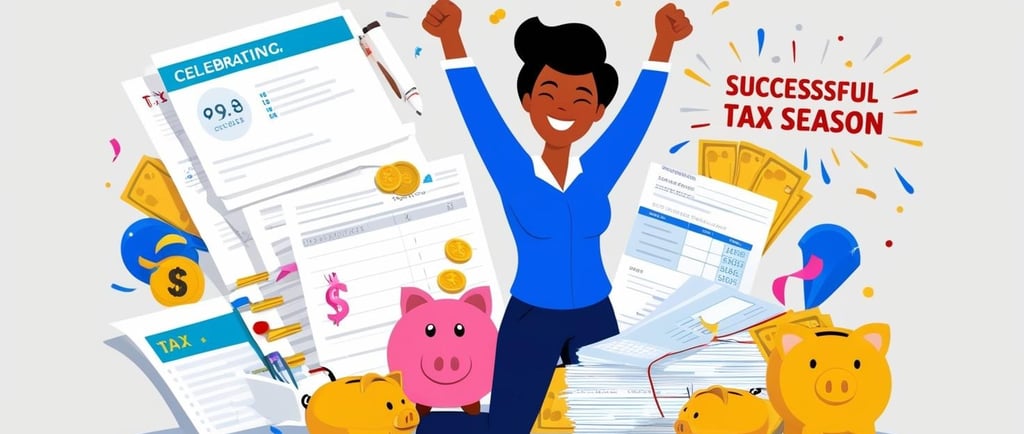The Importance of Business Receipt Organization: Simplify, Save, and Succeed
Business receipt organization is a critical practice for anyone managing finances, whether for personal or professional purposes. By keeping receipts systematically sorted—whether digitally or physically—you simplify tax preparation, ensure compliance, and gain insights into your spending patterns. For business owners, it’s essential for tracking expenses, maintaining transparency, and making informed decisions. Additionally, organized receipts safeguard against disputes, help with warranty claims, and ensure you don’t miss out on deductions or reimbursements. With the right tools and habits, organizing receipts becomes a straightforward process that saves time, money, and stress, empowering you to focus on growth and success.
Nathan Stadler
1/1/20253 min read


Whether you’re running a business, freelancing, or managing personal finances, business receipt organization might feel like a tedious task. But the truth is, having a system in place to track and store receipts can be a game-changer for your financial health and peace of mind. Here’s why it matters and how you can turn this mundane chore into a habit that works for you.
1. Tax Time? No Stress, Just Success
One of the biggest headaches during tax season is scrambling to find proof of expenses. Whether it’s for claiming deductions, validating business expenses, or ensuring compliance, business receipt organization is your lifeline. A well-organized system ensures you can quickly locate and categorize expenses, saving you hours (and possibly penalties) when filing taxes.
Pro Tip: Use folders (physical or digital) labeled by month or category to keep things sorted. Digital tools like receipt scanners or apps can make retrieval effortless.
2. Tracking Spending: Know Where Your Money Goes
Receipts offer a clear record of your spending habits. By organizing and reviewing them regularly, you gain insights into where your money is going. This can help you identify unnecessary expenses, create realistic budgets, and stick to financial goals.
Actionable Idea: Set aside 15 minutes a week to go through your receipts and log them into a spreadsheet or budgeting app.
3. Business Growth: Stay Ahead of the Curve
For business owners, business receipt organization isn’t just about tracking; it’s about growth. Having an accurate record of your expenses can help you make data-driven decisions, apply for loans, or attract investors. Additionally, it helps maintain transparency, ensuring smooth audits and professional credibility.
Quick Win: Implement an expense tracking system that integrates with accounting software to streamline your processes.
4. Protect Yourself: Proof of Purchase Matters
Life is unpredictable. A product may need to be returned, a warranty claim filed, or a service disputed. Organized receipts act as proof of purchase and safeguard your consumer rights. Without them, you risk losing time and money trying to resolve issues.
Smart Tip: Keep a separate folder (physical or digital) for receipts related to high-value purchases or warranties.
5. Save Money and Time
Time is money, and the hours you spend searching for a lost receipt can add up. Plus, without proper records, you might miss out on reimbursements or deductions. Staying organized minimizes this risk and ensures you’re getting every dollar you’re entitled to.
Effortless Idea: Use cloud storage to back up scanned receipts, so you never lose them.
6. Simplify Your Life: Peace of Mind Included
There’s something deeply satisfying about knowing exactly where everything is. Business receipt organization reduces mental clutter and frees up your time and energy for things that truly matter.
Try This: Create a routine—maybe at the end of each day or week—where you file or upload your receipts. When it becomes a habit, it feels effortless.
Getting Started: Simple Steps to Success
Here’s how to build an efficient business receipt organization system:
Choose Your Method: Decide between physical folders, digital storage, or a combination of both.
Categorize: Sort receipts by type (personal, business, deductible, etc.).
Go Digital: Use apps like Expensify or Wave to scan and organize your receipts digitally.
Regular Maintenance: Set aside a specific time each week or month to review and file receipts.
Final Thoughts
Organizing receipts, especially for business purposes, may not be the most glamorous task, but its benefits are undeniable. From simplifying tax preparation to saving money and ensuring financial clarity, this small habit can lead to significant rewards. Plus, once you have a system in place, the process becomes almost second nature.
So, take a step today toward a more organized tomorrow. Your wallet, your accountant, and your future self will thank you. Mastering business receipt organization is the key to staying stress-free and financially savvy.


Connect
Support
nate@booksbalancer.com
509-818-0335
© 2024. All rights reserved.
